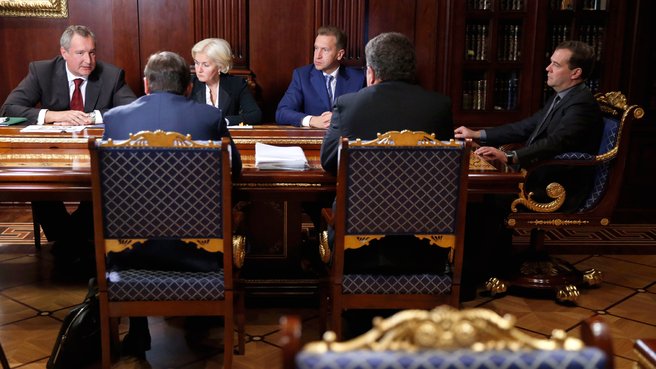Transcript:
Dmitry Medvedev: Two months ago, in early July, I gave an instruction on conducting a thorough investigation into the failed launch of the Proton-M that carried GLONASS satellites, as a result of which we sustained considerable losses.
Today I’d like you to report on the work of the special interagency commission, all the more so since a group of independent experts has also presented its conclusion – this is what you’ve told me. The commission looked into not only the reasons for the mishap, but also the organisation of management in Roskosmos (Federal Space Agency) and the operation of the enterprises subordinate to it. The task of the commission was to find out what miscalculations were made and who is to blame for what happened.
I’ve received your report and know that people have already been reprimanded and dismissed or suspended from their positions, but we’ve also agreed to prepare proposals on upgrading the quality of equipment and control over it. This is the first point.
And the second point, which I’ve already mentioned. We should find out why we did not have property insurance. If we compare the cost of an insurance contract (that is fairly high) to that of the lost satellites, we’ll see that these sums are incommensurate. Hence, such launches should be insured and those who haven’t done this should explain why.
The technological causes of the failure have also been revealed (I hope you’ll report on them), and it is necessary to check all carriers that have been produced. In view of the work that has been done, we’ve made a decision to resume Proton launches from the Baikonur Cosmodrome and informed our Kazakh partners about this.
Mr Rogozin, could you please tell us about the conclusions of the commission and your proposals on what should be done in view of the earlier decisions on the need to upgrade the entire industry and the system of running space affairs in this country? Go ahead, please.
Dmitry Rogozin: Thank you, Mr Medvedev. Following your decision, we established a special government commission to conduct parallel inquiries into the causes of the July 2 failure. We have invited independent experts that have been working in the space missile industry but are not connected with the Khrunichev Centre, which is the producer of Proton and Proton-M rockets.
Both the Roskosmos interdepartamental comission and our special commission have come to the same conclusion – the failure was due to a gross technological mistake in the assembly of a Proton-M rocket. Namely, the rate sensor in one of the control systems, notably the yaw channel, was installed upside down – actually at 180 degree in the wrong direction. We’ve found material evidence of this at Baikonur and I’m ready to show you photos that our experts used in their work – they focused on these fragments. To sum up, out of six sensors retrieved from the rocket debris, the three ones in the pitch channel were installed correctly but the three in the yaw channel were put in incorrectly. In addition, we’ve established why the quality control department missed such a blunder. It appears that this part was excluded from the list of compulsory checks by military experts in 2011.
In addition to the work of the Roskosmos commission, we have raised additional questions, for instance the one you’ve already mentioned – why wasn’t this launch insured? It was only covered by third party liability insurance.
The second question is also technical – why did the rocket start from its launching pad 0.4 seconds ahead of time? It appeared that on the third question… This does not directly bear on the accident but we’ve still checked on all other rockets handled by this “craftsman.” The inquiry has shown that three sensors were installed improperly only on this carrier and everything was done properly on all others.
We’ve also reviewed the operation of Roskosmos. It appears that it has not fulfilled your instructions to tailor its structure to the law on space activities. We believe our recent problems with launches are a direct consequence of this failure and managerial decisions made until now.
The Defence Ministry centre and the head R&D organisation of the space missile industry have deemed it possible to resume launches of Proton-M rockets after all defects detected by the commissions are removed. We are planning to make the first launch in late September but, as was mentioned, we should coordinate this with the Kazakh side. You’ve noted quite rightly that those who are to blame for this failure at the producing plant have already been punished.
As for causes of serious accidents, they are rooted in the extreme need to reform the entire space missile industry. The political leaders have made relevant decisions. In the near future, our commission will have to submit proposals on the structure of the would-be space missile corporation and the Roskosmos zone of responsibility. It has already started working.
I’d like to ask you to give us more time so that apart from this work we could also draft proposals on responsibility of specific persons and possible personnel decisions for Roskosmos and the would-be corporation.
Dmitry Medvedev: Okay. I’ll await your proposals. I just want to make one remark on insurance, regardless of who will be taken to task. I’d like you to hear these words and bring them home to the top management of Roskosmos and all other agencies. Regrettably, our recent practice has shown that we have to accept huge insurance expenses. So please make sure that all future launches are supported by insurance contracts, not only on third party but also property liability. We should plan budget allocations for this purpose and I’ll instruct the Ministry of Finance on this score.
Dmitry Rogozin: Mr Medvedev, the Defence Industry Commission will fulfill your instructions.
Dmitry Medvedev: It’s agreed, then.
<…>








